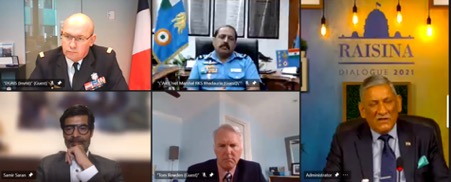
Oceans for Democracy, a closed door roundtable saw Gen Bipin Rawat (@HQ_IDS_India), ACM Rakesh Bhadauria (@IAF_MCC), Gen Luc de Rancourt and other experts discussing the navigating the post pandemic #IndoPacific #Raisina2021 

Also part of the conversation were @anupamifs, @MalikAshok, Tom Rowden and @LisaCurtisDC who examined the emergence of the Indo-Pacific as a significant geopolitical center. #Raisina2021 

Engaging over security, trade cooperation and the reconfiguration of supply chains were experts like @LKCyber, @sjaju1, @TheresaAFallon and @nilanthis #Raisina2021 

Emerging sources of security threats formed a key part of the dialogue, with the #Quad and #FONOP taking center stage #Raisina2021
• • •
Missing some Tweet in this thread? You can try to
force a refresh






